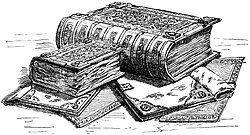
Back Domesday Book Afrikaans Domesday Book ALS كتاب ونشيستر Arabic Кніга Страшнага суда Byelorussian Книга на Страшния съд Bulgarian Domesday Book Breton Domesday Book Catalan Domesday Book Czech Llyfr Dydd y Farn Welsh Domesday Book Danish
| Domesday Book | |
|---|---|
| The National Archives, Kew, London | |
 Domesday Book: an engraving published in 1900. Great Domesday (the larger volume) and Little Domesday (the smaller volume), in their 1869 bindings, lie on their older "Tudor" bindings. | |
| Also known as |
|
| Date | 1086 |
| Place of origin | England |
| Language(s) | Medieval Latin |
Domesday Book (/ˈduːmzdeɪ/ DOOMZ-day; the Middle English spelling of "Doomsday Book") is a manuscript record of the Great Survey of much of England and parts of Wales completed in 1086 at the behest of King William the Conqueror.[1] The manuscript was originally known by the Latin name Liber de Wintonia, meaning "Book of Winchester", where it was originally kept in the royal treasury.[2] The Anglo-Saxon Chronicle states that in 1085 the king sent his agents to survey every shire in England, to list his holdings and dues owed to him.[3]
Written in Medieval Latin, it was highly abbreviated[a] and included some vernacular native terms without Latin equivalents. The survey's main purpose was to record the annual value of every piece of landed property to its lord, and the resources in land, labour force, and livestock from which the value derived.
The name "Domesday Book" came into use in the 12th century.[4] Richard FitzNeal wrote in the Dialogus de Scaccario (c. 1179) that the book was so called because its decisions were unalterable, like those of the Last Judgment, and its sentence could not be quashed.[5]
The manuscript is held at The National Archives at Kew, London. Domesday was first printed in full in 1783, and in 2011 the Open Domesday site made the manuscript available online.[6]
The book is an invaluable primary source for modern historians and historical economists. No survey approaching the scope and extent of Domesday Book was attempted again in Britain until the 1873 Return of Owners of Land (sometimes termed the "Modern Domesday")[7] which presented the first complete, post-Domesday picture of the distribution of landed property in the United Kingdom.[8]
- ^ "Domesday Book". Merriam-Webster Online. Archived from the original on 8 February 2012. Retrieved 13 October 2011.
- ^ "Domesday Book". Dictionary.com.
- ^ The Anglo-Saxon Chronicle. Translated by Giles, J. A.; Ingram, J. Project Gutenberg. 1996. Archived from the original on 29 June 2011. Retrieved 6 November 2016.
- ^ Emerson, Ralph Waldo & Burkholder, Robert E. (Notes) (1971). The Collected Works of Ralph Waldo Emerson: English Traits. Vol. 5. Harvard University Press. p. 250. ISBN 978-0674139923. Archived from the original on 13 January 2023. Retrieved 25 October 2015.
- ^ Johnson, C., ed. (1950). Dialogus de Scaccario, the Course of the Exchequer, and Constitutio Domus Regis, the King's Household. London. p. 64.
{{cite book}}: CS1 maint: location missing publisher (link) - ^ Cellan-Jones, Rory (13 May 2011). "Domesday Reloaded project: The 1086 version". BBC News. Archived from the original on 12 December 2017. Retrieved 21 July 2018.
- ^ Hoskins, W.G. (1954). A New Survey of England. Devon, London. p. 87.
{{cite book}}: CS1 maint: location missing publisher (link), - ^ Return of Owners of Land, 1873, Wales, Scotland, Ireland. 1873. Archived from the original on 10 September 2012. Retrieved 15 April 2013.
Cite error: There are <ref group=lower-alpha> tags or {{efn}} templates on this page, but the references will not show without a {{reflist|group=lower-alpha}} template or {{notelist}} template (see the help page).
© MMXXIII Rich X Search. We shall prevail. All rights reserved. Rich X Search